Praziquantel
Praziquantel dosages: 600 mg
Praziquantel packs: 1 pills
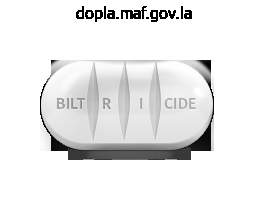
Cheap praziquantel 600mg mastercard
Pederson L medicinenetcom medications quality 600mg praziquantel, Benumof J: Incidence and magnitude of hypoxaemia with ketamine in a rural African hospital, Anaesthesia 48:67-69, 1993. Propofol-fentanyl anaesthesia at high altitude: anaesthetic requirements and haemodynamic variations when compared with anaesthesia at low altitude, Acta Anaesthesiol Scand 52:427-431, 2008. Aeromedical evacuation of patients with pneumocephalus: outcomes in 21 cases, Aviat Space Environ Med 79:30-35, 2008. Commercial air travel and in-flight pulmonary hypertension, Aviat Space Environ Med 84:65-67, 2013. Board of Science and Education: the impact of flying on passenger health: a guide for healthcare professionals, London, 2004, British Medical Association. Silverman D, Gendreau M: Medical issues associated with commercial flights, Lancet 373:2067-2077, 2009. Development of severe hypoxaemia in chronic obstructive pulmonary disease patients at 2,438 m (8,000 ft) altitude, Eur Respir J 15: 635-639, 2000. Effect of hypobaric hypoxia on blood gases in patients with restrictive lung disease, Eur Respir J 20:300-305, 2002. Hansen D: Suxamethonium-induced cardiac arrest and death following 5 days of immobilization, Eur J Anaesthesiol 15:240-241, 1998. Chronic nonhematogeneous osteomyelitis treated with adjuvant hyperbaric oxygen, J Bone Joint Surg Am 68:1210-1217, 1986. Survival factors in rhino-orbital-cerebral mucormycosis, Surv Ophthalmol 39:3-22, 1994. Effect of hyperbaric oxygen on neutrophil concentration and pulmonary sequestration in reperfusion injury, Arch Surg 131:756-760, 1996. Central retinal artery occlusion treated with oxygen: a literature review and treatment algorithm, Undersea Hyperb Med 39:943-953, 2012. Prospective assessment of outcomes in 411 patients treated with hyperbaric oxygen for chronic radiation tissue injury, Cancer 118:3860-3868, 2012. Hammarlund C, Sundberg T: Hyperbaric oxygen reduced size of chronic leg ulcers: a randomized double-blind study, Plast Reconstr Surg 93:829-833, 1994. Evaluation of hyperbaric oxygen for diabetic wounds - a prospective study, Undersea Hyperb Med 24:175-179, 1997. Hyperbaric oxygen therapy facilitates healing of chronic foot ulcers in patients with diabetes, Diabetes Care 33:998-1003, 2010. Hyperbaric oxygen therapy improves health-related quality of life in patients with diabetes and chronic foot ulcer, Diabet Med 28:186-190, 2011. Broughton 2nd G: Management of the brown recluse spider bite to the glans penis, Mil Med 161:627-629, 1996.
Blue Barberry (Oregon Grape). Praziquantel.
- Are there safety concerns?
- Dosing considerations for Oregon Grape.
- Psoriasis.
- What other names is Oregon Grape known by?
- Are there any interactions with medications?
- What is Oregon Grape?
Source: http://www.rxlist.com/script/main/art.asp?articlekey=96499
Buy praziquantel no prescription
Nuchal rigidity may be present in a mixed meningoencephalitis picture but should be absent in isolated encephalitis treatment brown recluse spider bite purchase praziquantel on line amex. Accompanying identifiers may be a vesicular rash associated with herpes zoster (although its absence does not remove zoster from suspicion), bilateral paralysis typical of West Nile disease, parotitis if mumps is suspected, and, of course, the hyperactivity, hydrophobia, and pharyngeal spasm of rabies. West Nile neuroinvasive disease has increased its incidence from 62 cases in 1999 to 438 in 2011, over 43 states, with estimates of up to 34,000 nonneurologic infections per year. These include vasculitis, systemic lupus erythematosus, stroke, rickettsial and parasitic infection, and drug-induced meningitis. Careful examination of clinical features, history, and laboratory data is necessary. Serum serology is helpful for the diagnosis of Epstein-Barr virus, mumps, and West Nile disease as sources of encephalitis. Herpes simplex type 1 infection carries a very poor outlook if it is not treated expeditiously, and a course of intravenous acyclovir is recommended as soon as samples are drawn. The pathogen remains unidentified more often than not, and outcome usually then depends on classification of the clinical features, with intractable seizure and cerebral edema carrying a poor prognosis. Community infections are frequently caused by Streptococcus pneumoniae, Haemophilus influenzae, Listeria monocytogenes, Neisseria meningitidis, and group B streptococci. Nosocomial infection, in contrast, predominantly arises in the neurosurgical patient, especially with the use of ventricular devices, and the pathogens here comprise gram-negative rods and staphylococci. Diagnostic features include fever almost invariably with the classic nuchal rigidity and change in mental status; less often, photophobia, papilledema, and new-onset seizures may be seen. A rash is typical of meningococcal infection, whereas arthritis occurs in a significant minority. Cerebral edema not infrequently develops in patients with meningitis and can lead to acute deterioration in mental status. Treatment should be delivered swiftly, pausing only to obtain emergency samples for Gram stain and culture. If no identification is possible on Gram stain, empiric antibiotic therapy should be delivered with third-generation cephalosporins. Nosocomial or trauma-associated infections can be effectively treated with cefepime and vancomycin. Steroids are useful adjuncts in bacterial meningitis and have been shown to reduce mortality. Many unfortunate instances of poor understanding have led to imperfect examination, misdiagnosis, and considerable distress to all concerned.
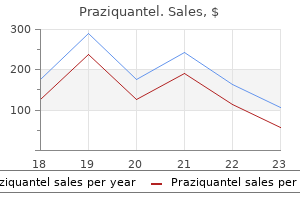
Purchase praziquantel once a day
Pain; possible fainting medications high blood pressure generic 600mg praziquantel otc, exhaustion, mechanical injury; and heart and respiratory function continue. Chapter 109: Electrical Safety in the Operating Room 3227 application of very low voltage or current to the heart, often intentionally, by means of external or internal cardiac pacemaker electrodes. Inadvertent microshock, however, is dangerous because it can produce ventricular fibrillation. A faulty endoscope and faulty dialysis equipment have caused deaths from accidental microshock. These are now exclusively used, and their safety with respect to microshock has been demonstrated by years of frequent use without reported complications. Such systems, however, are vulnerable to more subtle dangers, as was reported when a faulty cable connection permitted precision pressure tracings but caused a substantially lower pressure reading. This amount of current is considerably less than the peak electric current generated by an implanted pacemaker during a single pulse (0. Endovascular procedures performed by interventional neuroradiologists include the placement of procoagulant coils inside certain types of intracranial aneurysms. The coils are directly placed in aneurysms with a considerable depth and a narrow neck. However, when the aneurysm has a wide entrance and a short depth, concern is high that a loose coil could get carried away and act as a thrombus wherever it lodged. Therefore in such cases, a detachable coil is generally used to completely occlude the unfilled region. Although anesthesiologists should be aware of potential electrical hazards that come with new techniques,47 they should be comfortable about electrical issues in detachable coils inasmuch as they do not cause macroshock or microshock. During electrosurgery, high currents enter the patient through a small-area surface electrode at the tip of the cutting tool. The combination of high resistance (R), which is attributable to the small area, and high current (I) causes local tissue heating proportional to I2R, which produces cutting or coagulation. The tip of the electrode is also designed to produce lower current densities (low I2R) at points farther than a few millimeters from the electrode tip. Electrosurgery is therefore a form of highly controlled localized burning of tissue. Concern about suffering an unwanted electrosurgical burn is a legitimate issue for patients with metal jewelry that pierces the body, such as umbilical rings, nipple rings, earrings, and tongue studs, among others. Obviously, the best solution is to remove all metal jewelry before surgery, and its removal is highly recommended. However, removal of metal jewelry can, at times, be cumbersome, burdensome, inconvenient, or simply unwanted by the patient. In such instances, leaving the jewelry in place is reasonable if the site of electrosurgery is far from the jewelry and if the jewelry is not directly within the path of the electrical current that travels from High current density (maximum heating effect) Low current density (minimal heating effect) High current density Burn! Schematic diagram shows the flow of electric current through the body when small- or large-area grounding pads are used. As previously mentioned, in the case of no metal jewelry, electrical current rapidly fans out as it leaves the cutting electrode.
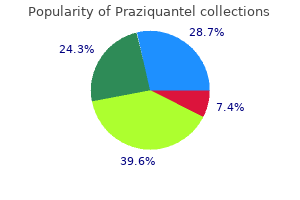
600mg praziquantel purchase visa
High-dose caffeine (10 mg/kg) has been recommended medicine hat tigers purchase praziquantel 600 mg mastercard,191 which may be an effective therapy. However, the half-life of caffeine in older former preterm infants is only 6 hours, and the first apnea spells after anesthesia may not be expressed until 12 hours. Predicted probability of apnea for all children by gestational age and weeks postconceptual age. The shaded boxes represent the overall rates of apnea for infants within that gestational age range. The probability of apnea was the same, regardless of postconceptual age or gestational age, for infants with anemia (horizontal solid black line). This infant had periodic breathing, which is distinctly unusual in a full-term infant and suggestive of a problem with control of respirations. These indices reflect the frequency of occlusive and partially occlusive respiratory events per hour of sleep. Of particular concern are children in whom cardiac dysfunction (cor pulmonale) has developed and those in whom postobstructive pulmonary edema could develop. Hospitals tend to admit the children to a 23-hour unit (to avoid the 24-hour hospital admission), thus observing the child for an extended time (usually not the full 23 hours) while minimizing the expense to the insurance provider. Although the circulation may be normal, there is never assurance that cardiac function is normal. Any child who has undergone a ventriculotomy may have some ventricular dysfunction caused by the incision; there is less potential for dysfunction if the surgical approach was through an atriotomy. Likewise, even relatively benign procedures such as open closure of ventricular or atrial septal defects can be associated with the later development of dysrhythmias. Some children, particularly those with repaired single-ventricle physiology, have a significant predisposition to sudden death as a result of pathologic arrhythmias; a careful history is particularly important in these children. Children with a single-ventricle physiology (Fontan) require very specific anesthetic management. These children often have other major issues such as protein-losing enteropathy and plastic bronchitis, and they are at significant anesthetic risk if one is unfamiliar with this unique physiologic abnormality. Ketorolac provides analgesia without adverse respiratory effects, but it is associated with an increased incidence of postoperative bleeding if given before achieving hemostasis. A further concern is the recent reports of deaths after tonsillectomy related to altered conversion of the prodrug codeine to morphine.
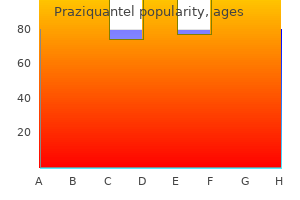
Order praziquantel no prescription
It is absolutely essential to have external modes of defibrillation available medications on backorder generic praziquantel 600mg online, as well as antiarrhythmics such as amiodarone, magnesium, and lidocaine, in the event of device failure. These devices are placed with the patient under general anesthesia with endotracheal intubation and controlled ventilation. Adequate analgesia can be provided with local infiltration with local anesthetics and shortacting intravenous opioids. The arrhythmia occurs along with long-standing myocardial dysfunction and residual lesions. Careful choice of anesthetic, monitoring, and early management of low cardiac output, especially in patients with single-ventricle physiology, are important. Prolonged periods of arrhythmia induction during mapping can result in a low cardiac output state, necessitating inotropic therapy. Despite reports of high acute success rates with catheter ablation, arrhythmia recurrence continues to be problematic in this population. Inadequate lesion size and depth with conventional radiofrequency ablation catheters are the principal reasons for recurrence. This device was able to successfully terminate 54% of treatable tachycardias by use of antitachycardia pacing, with no incidence of ventricular proarrhythmia. The patient usually Chapter 94: Anesthesia for Pediatric Cardiac Surgery 2849 myocardial contraction. Biventricular pacing is an attempt to resynchronize ventricular contraction by pacing both ventricles, thereby improving overall ventricular function. In patients with left bundle branch block, cardiac resynchronization therapy counteracts the underlying electrical and mechanical dyssynchrony, leading to improved contractility, function, exercise tolerance, and quality of life. Right bundle branch block is a common outcome after surgery for congenital heart lesions. Right ventricular pressure, volume loading, or both also may be present, with attendant right ventricular enlargement and dyskinesis. For elective procedures, coexisting enterococcal urinary tract infections should be treated before genitourinary or gastrointestinal procedures; for emergent procedures, in patients at highest risk for infective endocarditis, prophylaxis can be considered. Patients with implanted devices and hardware need to be assessed to ensure magnet compatibility and safety. Other coils, stents, and surgical clips produce interference and artifact with imaging but do not constitute a threat to patient safety. Patients who are younger, uncooperative, or claustrophobic require sedation or general anesthesia. Total intravenous anesthesia can be provided with a propofol infusion and a natural airway, avoiding the need for scavenging and allowing rapid recovery.
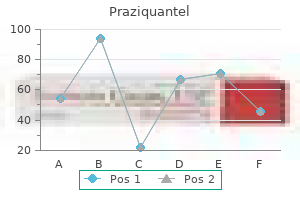
Discount praziquantel 600mg with visa
Approval processes vary considerably across organizations symptoms uterine prolapse purchase praziquantel 600mg with visa, and they usually culminate in action by a governing body. The Committee submits the document to the House of Delegates for one more vetting process by formal Reference Committee review. The Reference Committee then submits a recommendation for approval or disapproval to the House of Delegates, and the House of Delegates, in turn, votes on approval or disapproval without any changes to the guideline document. Should the guideline fail to be approved, the House of Delegates may direct the Committee to address concerns that have arisen and submit a revised guideline the following year. When the literature-based evidence, even when strong, is not in congruence with opinion-based sources of evidence, the task force may consider terminology that is less pronounced or may offer alternatives to the routine application of a recommended intervention. The intent of reviewing all categories of evidence collected during the development of a guideline is to ensure that the final recommendation has solid and broad-based evidence. Because the strength of a recommendation is based on congruence among the various categories of evidence, the final wording of a recommendation can reflect mitigating issues that may arise during the multiple vetting of the proposed recommendation. Rarely should a guideline recommendation be based solely on literature or opinion-based evidence. Other factors to consider include the readiness of practitioners to implement a recommended intervention and the regulatory requirements associated with an intervention. Therefore, a guideline task force must have the flexibility to make recommendations that are useful and applicable to a variety of clinical situations. When recommendations have been written and a draft document has been created, a final survey is conducted addressing the feasibility and cost of implementing a guideline. Will your clinical practice need new equipment, supplies or training in order to implement the Practice Advisory Would the Advisory require ongoing changes in your practice which will affect your costs How would implementation of the Advisory affect the amount of time spent on a typical case These guidelines serve to educate clinicians and standardize practice in key areas of patient care. A complete and unbiased evaluation of scientific literature is essential and critical to this end. However, scientific articles and observational literature should not be the sole sources of evidence for a guideline. Although literature is the primary source of scientific evidence for guidelines, other factors such as the feasibility, practicality, and professional acceptance of a recommendation also play a key role. Supplementing scientific findings with opinionbased evidence allows for the creation of a broad base of evidentiary support, thereby mitigating the risk of narrow interpretations of findings. Data from properly conducted formal surveys offer important evidence associated with the appropriateness and practicality of a treatment, whereas informal opinions from open forums, the Internet, and other sources are useful for validation and feasibility of implementation. Moreover, other sources of information, such as large observational and administrative databases, may also be helpful. The increased use of concise and transparent evidencebased guidelines allows clinicians to be more confident in the quality of the evidence, given the comprehensiveness and rigor of the underlying methodology. Illustration of patterns of findings from categorically distinct sources of evidence. Because evidence-based guidelines ultimately serve to promote clinical efficacy and patient safety, it is imperative that the process by which these documents are developed be clear and unequivocal; to ask for anything less could jeopardize the best interests of practitioners and their patients.
Syndromes
- Eat hot, well-cooked foods. Heat kills the bacteria. But do not eat hot foods that have been sitting around for a long time.
- Dizziness
- When you are struggling, talk to someone you trust about how you are feeling. Try to be around people who are caring and positive.
- You have speech, vision, or movement problems or loss of balance, especially if you have not had these symptoms with a headache before
- Most colas (unless they are labeled "caffeine-free") – 45 mg in 12 oz. drink
- Participating in sports
- Diuretics (water pills) to remove excess fluid in the lungs
- The skin over the shins does not thicken, as it sometimes does in people who have Graves disease.
- Bronchoscopy -- camera down the throat to see burns in the airways and lungs
- Multiple myeloma
600mg praziquantel purchase with amex
Time between tests is less important for diagnosis than for the opportunity to start communicating with and preparing the family treatment juvenile rheumatoid arthritis purchase praziquantel in india. One of the tests should include an appropriately conducted apnea trial in the presence of the physician, with confirmation of adequate changes in Pco2. The hospital should have an institutionally approved protocol for the conduct of these tests and mechanisms in place for review and quality improvement. The presence of an advance directive offers major benefits, and the neurocritical care unit should have an admissions protocol that includes asking all competent, conscious patients to consider making their attitudes or wishes known. Regular family and patient conferences allow communication of prognosis as it is appropriate and offer the opportunity for correction of any misconceptions, as well as progressive education of the family to anticipated problems. Internal institutional mechanisms for raising concerns and conducting reviews should be in place. This is often facilitated by the presence of an institutional ethics committee, whose members can examine the issues, promote educational discussion, and help achieve a consensus. Orders for limitation or withdrawal of therapy should be written explicitly, and institutional protocols should be used wherever possible. Unfortunately, as well as the mortality described previously, significant life-altering morbidity occurs, to the extent that many patients and families would not desire aggressive therapy. However, the ethical imperative in Western culture is to preserve the autonomy of the individual (along with the principles of nonmaleficence, beneficence, and justice), and this has been extended to health care decision making. This situation may lead to uncomfortable choices and communication within the health care team, whose members may have differing opinions on goals, and from there to the patient and relatives, who, again, may think very differently. This may involve planning and discussion among the team members in advance of meeting with families. The best care is provided in circumstances that allow multidisciplinary collaboration and appropriate attention to detail of often complex and demanding pathologic processes, but integrating them optimally under the direction of the critical care physician. Zygun D: Non-neurological organ dysfunction in neurocritical care: impact on outcome and etiological considerations, Curr Opin Crit Care 11:139-143, 2005. Klatzo I: Pathophysiological aspects of brain edema, Acta Neuropathol (Berl) 72:236-239, 1987. Beaumont A, Hayasaki K, Marmarou A, et al: Contrasting effects of dopamine therapy in experimental brain injury, J Neurotrauma 18:1359-1372, 2001. Stocchetti N, Colombo A, Ortolano F, et al: Time course of intracranial hypertension after traumatic brain injury, J Neurotrauma 24:1339-1346, 2007. Muench E, Bauhuf C, Roth H, et al: Effects of positive endexpiratory pressure on regional cerebral blood flow, intracranial pressure, and brain tissue oxygenation, Crit Care Med 33:23672372, 2005. Karanjia N, Nordquist D, Stevens R, Nyquist P: A clinical description of extubation failure in patients with primary brain injury, Neurocrit Care 15(1):4-12, 2011. Mascia L, Zavala E, Bosma K, et al: High tidal volume is associated with the development of acute lung injury after severe brain injury: an international observational study, Crit Care Med 35:1815-1820, 2007. Xiao F: Bench to bedside: brain edema and cerebral resuscitation: the present and future, Acad Emerg Med 9:933-946, 2002.
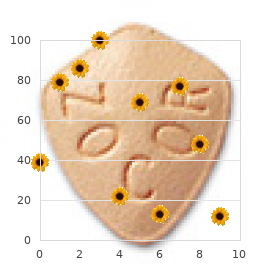
Praziquantel 600mg purchase mastercard
Unlike morphine treatment tinnitus discount praziquantel 600 mg free shipping, the fraction of drug that enters the brain of neonates is similar to that entering the brain of older children. As with all drugs administered to neonates, a large patientto-patient variability in metabolism and response exists. Sufentanil Sufentanil has been primarily used for cardiac anesthesia; age-dependent kinetics are also evident, particularly in the first month of life (also see Chapters 31 and 94). This drug must be administered with caution because severe bradycardia and asystole have been reported when a vagolytic drug was not simultaneously administered. Unlike virtually all other medications, its clearance is more rapid in neonates than it is in older children, probably because of elimination of remifentanil by nonspecific plasma and tissue esterases, as well as the larger volume of distribution in neonates. The importance of this observation is that developmental immaturity of liver and renal function does not affect the pharmacokinetics of remifentanil. Studies in adults have found that even after prolonged infusions, the time to a 50% reduction in effect-site concentration. Of further interest is the very small patient-to-patient variability in pharmacokinetic parameters when compared with similar studies examining other opioids, particularly in infants and neonates. The particularly favorable pharmacokinetics in neonates allows the provision of a deep opioid-induced plane of anesthesia while avoiding cardiovascular depression and the need for postoperative ventilation. This drug is also very useful for cardiac surgery in children as a means of providing adequate opioid analgesia, cardiovascular stability, and early extubation while transitioning to longer-acting low dose opioids (also see Chapter 94). Several studies have examined bolus doses of remifentanil as an alternative to succinylcholine. In addition, the duration of apnea was longer in the remifentanil group than in those who received an equivalent dose of propofol combined with succinylcholine (1 mg/kg); none of the children in the remifentanil group developed chest wall rigidity. Data are currently insufficient to support the routine substitution of remifentanil for succinylcholine for rapid sequence tracheal intubation. Because bolus doses of remifentanil are associated with hypotension and bradycardia, a vagolytic drug should also be administered. Two studies have compared the somatic and autonomic responses to skin incision during continuous remifentanil infusion in adults and children. The reason for such a disparity in drug requirement between adults and children is not clear. However, this observation is certainly clinically important because it suggests the possible need to (1) start at higher initial infusion rates, (2) rapidly increase infusion rates after an initial assessment of responses, (3) supplement the anesthetic with nitrous oxide or a volatile anesthetic, or (4) add another analgesic. This author has used a fixed combination of 100 g of remifentanil combined with 18 mL of propofol (final concentration, 5 g/ mL of remifentanil) for children younger than 10 years of age and a lower fixed combination of 50 g of remifentanil in 19 mL of propofol (final concentration of 2. It should also be carried into the vein by a second continuous infusion because variations in drug delivery related to differences in intravenous fluid delivery can have profound effects on the rate of opioid administration.
Buy generic praziquantel
Patients may be refractory to ephedrine and Neo-Synephrine and require vasopressin to maintain blood pressure treatment 2nd 3rd degree burns purchase generic praziquantel on-line. These risks are important considerations in decisions regarding the appropriate range for blood pressure and fluid resuscitation requirements. However, simultaneous deliberate hypotension and hemodilution to a hematocrit of less than 25% should be done with caution. Whereas contemporary practice is to conserve blood by initially replacing lost blood with fluids, the effect of such hemodilution will often be a large fluid resuscitation, in some instances further amplifying an already high intravascular volume resuscitation, particularly in repeat operations for spine fusion, which typically involves large fluid and blood requirements. A relatively "dry" fluid strategy has been tested in abdominal surgery, but its use is controversial and has risks and outcomes have not been widely tested in any other surgery. Withholding fluids is inadvisable because of many other risks, including multiple organ failure. However, in some instances the anesthesiologist may be able to persuade a surgeon to follow a less ambitious surgical plan. This decision requires an assessment of the associated risks for multiple surgeries (infection, spinal instability) but may significantly shorten the duration of each procedure. Another strategy is to advocate for patients by regular preoperative conferencing with surgeons. Anticipating high blood loss and other risks may enhance perioperative planning and care in spine surgery patients (R. While major changes were not made, analysis of the literature was updated and the recommendations were more detailed. In contrast, the 2012 Summary of Advisory Statements has 22 bullet points subdivided into Preoperative, Intraoperative, Staging of Surgical Procedures, and Postoperative Management. The 2006 Task Force concluded that high-risk patients who have surgery that is prolonged in duration and/or have large blood loss have an increased risk of perioperative visual loss. Yet perioperative visual loss was not related to blood loss per se, hemoglobin levels, or the use of crystalloids. They concluded that newer findings and the literature do not justify major changes in the 2006 recommendations. The Task Force recommended considering informing high-risk patients, that is, those undergoing prolonged spine fusion surgery with large anticipated blood loss, about this risk. Accordingly, anesthesiologists may wish to consider requesting that the surgeon discuss the possible complication at an earlier, more relaxed preoperative visit. Complete blindness implies damage to both the left and right occipital cortex, whereas a more localized injury produces homonymous hemianopia. Because the visual pathway travels through the parietotemporal lobes, a perioperative cerebrovascular accident affecting the internal carotid, or middle, basilar, or posterior cerebral arteries is the more common cause of cortical blindness.
Buy cheap praziquantel 600 mg line
In Smith I symptoms 6dpiui 600 mg praziquantel purchase otc, McWhinnie D, Jackson I, editors: Oxford specialist handbook of day surgery, London, 2011, Oxford University Press, pp 199-206. Lermitte J, Chung F: Patient selection in ambulatory surgery, Curr Opin Anesthesiol 18:598-602, 2005. A Danish multicentre study of morbidity after 57,709 day surgery procedures, Acta Anaesthesiol Scand 56(3):323-331, 2012. Association of Anaesthetists of Great Britain and Ireland, British Association of Day Surgery, Verma R, et al: Day case and short stay surgery: 2, Anaesthesia 66:417-434, 2011. In Smith I, McWhinnie D, Jackson I, editors: Oxford specialist handbook of day surgery, London, 2011, Oxford University Press, pp 41-50. Ankichetty S, Chung F: Considerations for patients with obstructive sleep apnea undergoing ambulatory surgery, Curr Opin Anesthesiol 24:605-611, 2011. Raeder J: Bariatric procedures as day/short stay surgery: is it possible and reasonable Chung F, Mezei G, Tong D: Adverse events in ambulatory surgery: a comparison between elderly and younger patients, Can J Anaesth 46:309-321, 1999. Chung F, Mezei G, Tong D: Pre-existing medical conditions as predictors of adverse events in day-case surgery, Br J Anaesth 83:262-270, 1999. Bettelli G: Anaesthesia for the elderly outpatient: preoperative assessment and evaluation, anaesthetic technique and postoperative pain management. Burden N: Discharge planning for the elderly ambulatory surgical patient, J Perianesth Nurs 19(6):401-405, 2004. Kinley H, Czoski-Murray C, George S, et al: Effectiveness of appropriately trained nurses in preoperative assessment: randomised controlled equivalence/non-inferiority trial, Br Med J 325(7376):1323, 2002. Arvidsson S: Preparation of adult patients for anaesthesia and surgery, Acta Anaesthesiol Scand 40(8 Part 2):962-970, 1996. Smith I, McWhinnie D, Jackson I, editors: Day case surgery (oxford specialist handbook series), London, 2011, Oxford University Press. Dzankic S, Pastor D, Gonzalez C, et al: the prevalence and predictive value of abnormal preoperative laboratory tests in elderly surgical patients, Anesth Analg 93(2):301-308, 2001. Chung F, Yuan H, Yin L, et al: Elimination of preoperative testing in ambulatory surgery, Anesth Analg 108(2):467-475, 2009. In Smith I, McWhinnie D, Jackson I, editors: Oxford specialist handbook of day surgery, London, 2011, Oxford University Press, pp 161-197. In Smith I, McWhinnie D, Jackson I, editors: Oxford specialist handbook of day surgery, London, 2011, Oxford University Press, pp 51-62. Smith I, Jackson I: Beta-blockers, calcium channel blockers, angiotensin converting enzyme inhibitors and angiotensin receptor blockers: should they be stopped or not before ambulatory anaesthesia Girish M, Trayner E, Damman O, et al: Symptom-limited stair climbing as a predictor of postoperative cardiopulmonary complications after high-risk surgery, Chest 120:1147-1151, 2001. Chung F, Imasogie N, Ho J, et al: Frequency and implications of ambulatory surgery without a patient escort, Can J Anaesth 52(10):1022-1026, 2005. Chung F, Assmann N: Car accidents after ambulatory surgery in patients without an escort, Anesth Analg 106(3):817-820, 2008.
Hauke, 37 years: The glow, which has the same color as light emitted from an argon laser, represents a continuous electrical discharge in a small, flowing column of argon gas having a density that supports electric current.
Anktos, 29 years: The circuit bag must be emptied and filled several times so that the entire circuit is filled with 5% halothane or 8% sevoflurane.
Thordir, 34 years: For these techniques, continuous infusion (2 to 5 mL/hr) or on-demand injections (2 to 5 mL) of low-concentration levobupivacaine or ropivacaine (0.
Kaelin, 23 years: Actual discharge is frequently nurse-managed,451,456 provided patients have been managed according to an appropriate protocol and have met all the necessary discharge criteria.
Curtis, 44 years: A preoperative oral dose of 40 mg has efficacy similar to that of ondansetron for the reduction of nausea, with a potentially superior effect in the suppression of vomiting for 48 hours after administration.
Keldron, 39 years: Molecular-weight cut-off of the membrane is significantly higher than that of hemofilters (100 to 1000 kD).
Renwik, 61 years: Because this reduction in blood flow is abolished in neutropenia, leukocytes are likely required for this effect.
Rathgar, 62 years: Further transmission of nociceptive information is determined by complex modulating influences in the spinal cord.
Achmed, 54 years: Evidence of benefit to the patient is noted in green or blue, whereas harm is noted in reds or oranges.
Goose, 30 years: Chapter 106: Nutrition and Metabolomics 3151 the first 72 hours after insertion but then increase in incidence.
Makas, 42 years: The comprehensive treatment program has provided a structured environment that is much different from the workplace.
Innostian, 49 years: The left side of the diagram represents the secondary coil in a transformer whose primary coil is not shown.
Denpok, 35 years: In Bissonnette B, Dalens B, editors: Pediatric Anesthesia: principles and ractice, New York, 2002, McGraw-Hill, p 528.
Porgan, 46 years: Wattel F, Mathieu D, Neviere R, et al: Carbon monoxide poisoning, Presse Med 25:1425-1429, 1996.
Sinikar, 28 years: However, ketamine can possibly be used in the brain-injured patient, especially in patients with multiple trauma and if etomidate is not indicated.
Norris, 40 years: Substance Muscle relaxants Natural rubber latex Antibiotics Hypnotics Colloids Opioids Other substances 12.
9 of 10 - Review by P. Topork
Votes: 53 votes
Total customer reviews: 53
